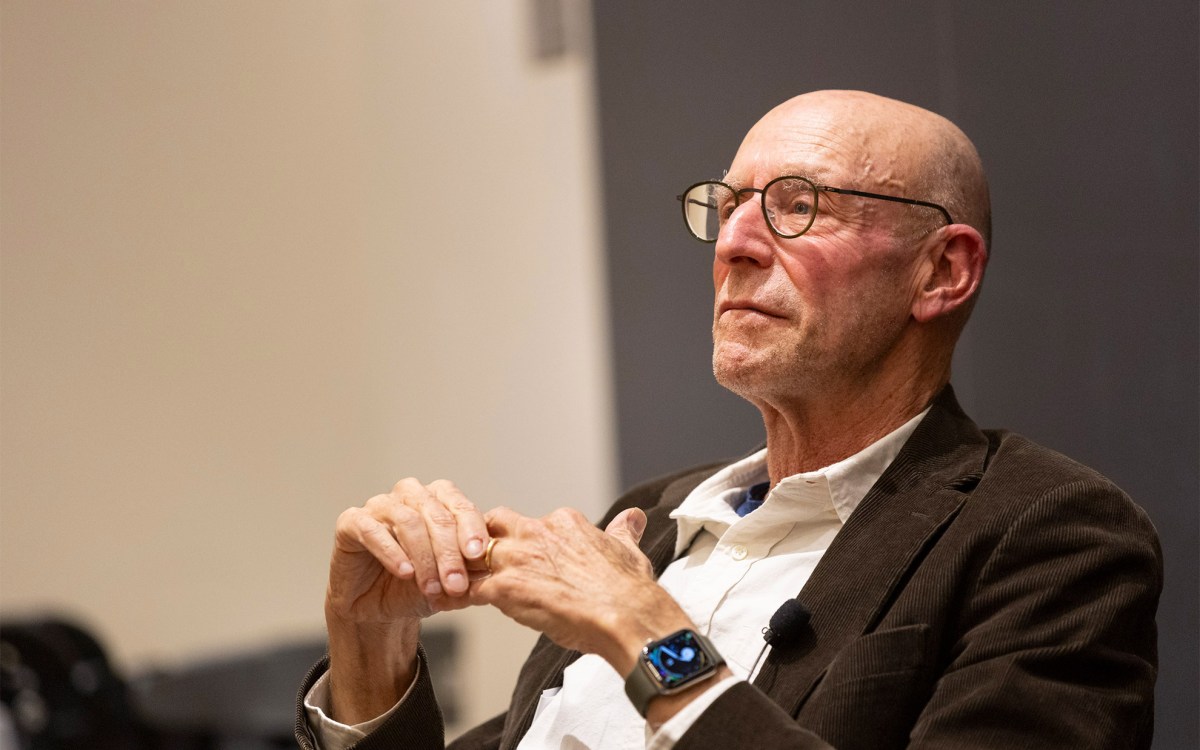Why are you cursing?
Photo illustration by Liz Zonarich/Harvard Staff
Steven Pinker breaks down history of taboo words, different categories of swearing, and the meaning conveyed by a bleep
Part of the Wondering series
A series of random questions answered by Harvard experts.
Steven Pinker, the Johnstone Family Professor of Psychology, wrote a chapter on swearing for his book “The Stuff of Thought: Language as a Window into Human Nature” (2007).
The content of swear words varies from culture to culture, from language to language, and across time periods, as we see in the fact that damn and hell used to be highly fraught taboo words in English. Part of that has to do with the decline of religious sensibilities. In an era in which people literally thought that God was monitoring every word and were worried about spending eternity in hell, a curse that damned you to hell would have had more of an impact than it does today. Likewise with sexuality. Before the sexual revolution, words like f*ck and pr*ck were far more offensive than they are today, though they still retain the taboo status. Cultural norms and taboos give rise historically to swear words.
The common denominator of swear words is that they evoke a negative emotion, whether it be dread of the supernatural, as in religious taboo words; disgust at bodily secretions; revulsion at depraved sexual acts; or a hatred of certain disfavored or marginalized people.
The act of swearing indicates that someone is prepared to inflict discomfort, but it can also be used to express informality; a setting where we don’t have to watch what we say. A sweeping cultural change that began around the turn of the 20th century eroded formality, inhibition, and decorum in all spheres of life in favor of authenticity, self-expression, and spontaneity. This informalization extended to a relaxing of the inhibition against swearing.
Among the types of swearing, there is dysphemistic swearing. Dysphemism is the opposite of euphemism, a word chosen to avoid arousing emotion in your listener. Dysphemism is a word selected precisely because it arouses emotion, as when you say, “Will you please pick up your dog sh*t?” because you want to convey your anger and revulsion. Abusive swearing is when you use negative emotion to humiliate or intimidate someone by likening them to an unpleasant or at least emotionally fraught object, as when you call someone a d*ck or accuse them of engaging in undignified sexual activities. There is cathartic swearing, as when you hit your head on a cupboard door, and there is idiomatic swearing, as in, “get your sh*t together,” “pissed off,” “a pain in the ass.”
There are also truncated profanities, where sometimes people will stifle the urge to utter a taboo word by using a word that rhymes with or alliterates with the taboo word. Like geez, gee-whiz for Jesus Christ, or gosh, golly for God. One other feature of taboo words is the use of hyphens and asterisks. The use of asterisks raises the question: Who’s being fooled by writing f*ck, or when something is bleeped out on TV? It’s not so much the concept behind the word, but it is the very act of using the word that both speaker and hearer understand to be an intentional attempt at shocking or transgressing. What the truncated profanity does is withdraw that intention but keep all else constant. It signals “I am conspicuously and deliberately not trying to offend you,” something that ordinarily is the whole point of swearing.
I think swearing ought to be used judiciously. The potent use of taboo language depends on it not being used in every sentence, but if it’s something that you can hold and reserve for when you want to shock an audience or call attention to the dangerous or evocative aspect of something. You might want to keep the powder dry, as they say. I find it rather tedious when people gratuitously use f*ck as if it were the only means at their disposal to emphasize a point. With the English language having some half a million words, it’s just more pleasing if people dip into the lexicon and find the best word, instead of just falling back on the easy taboo word.
— As told to Liz Mineo, Harvard Staff Writer

















